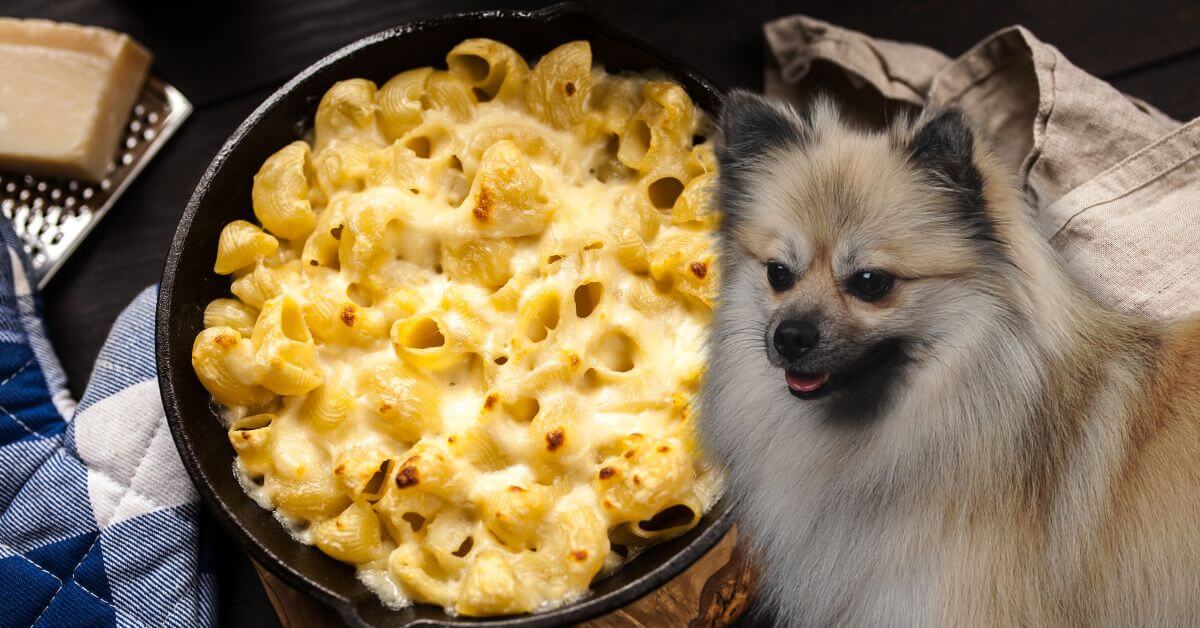Can Dogs Eat Mac and Cheese?
Not only do we like feeding them scraps, but many dogs also adore stealing our food. When it comes to mac and cheese, it’s hard to say no, as dogs seem to love it! While mac and cheese is not toxic for dogs and is safe in small amounts, it’s not their food, and we should not give them any—not Kraft mac and cheese, not homemade, nothing. It’s simply not made for dogs.

Why is mac and cheese not made for dogs? Hate to break it to you, but mac and cheese are mostly empty calories, with lots of carbs and fat, not to mention sodium. That doesn’t mean that mac and cheese is unhealthy; it just means that it’s a simple, cozy, comforting meal that we enjoy, but it’s not the best choice for our dogs.
Popular mac and cheese types, their nutritional value and dog safety
It’s important to understand the nutritional value and ingredients of different types of mac and cheese so we know what can happen to dogs if they steal some. Some dogs steal the cheese packets and eat them because they’re salty and sprinkled with tasty additives. So it’s better to understand what’s inside them!
Can dogs eat Kraft mac and cheese?
Oh, with its gooey texture, the original Kraft mac and cheese is one of the best comfort meals! While it’s safe to share with your dog, you should not give it every day or even every week! Let’s break down the ingredients on Kraft’s official website.
Ingredients:
- Enriched Macaroni (Wheat Flour, Durum Flour, Niacin, Ferrous Sulfate [Iron], Thiamin Mononitrate [Vitamin B1], Riboflavin [Vitamin B2], Folic Acid)
- Cheese Sauce Mix (Whey, Milkfat, Salt, Milk Protein Concentrate, Sodium Tripolyphosphate, Contains Less Than 2% of Tapioca Flour, Citric Acid, Lactic Acid, Sodium Phosphate, Calcium Phosphate, with Paprika, Turmeric, and Annatto Added for Color, Enzymes, Cheese Culture)
Nutritional concerns for dogs:
- High in sodium and fat
Unsafe ingredients for dogs:
- High Sodium Content: Excessive sodium can lead to dehydration and increased blood pressure in dogs.
- Sodium Tripolyphosphate (STPP): This preservative is used to retain moisture and make foods appear fresher. While generally recognized as safe, the US National Institute for Occupational Safety and Health lists it as a possible neurotoxin and a mild skin irritant. It’s best to avoid foods containing STPP, especially if your dog has skin problems. And you wouldn’t believe this — some dog foods have STPP already, so make sure not to add any extra to their diet!
Can dogs eat Panera mac and cheese?
Another classic and cult favorite, Panera mac and cheese, is flagged for its high sodium content!
Ingredients:
- Macaroni and Cheese (Cooked Enriched Macaroni Product [water, semolina wheat, egg whites, egg white powder, niacin, ferrous sulfate, thiamine mononitrate, riboflavin, folic acid], water, cheddar cheese [pasteurized milk, bacterial cultures, salt, microbial enzymes], cream, soybean oil, milk, concentrated skim milk, whey, skim milk, salt, butter [cream, salt], whey protein concentrate, milk fat, sodium citrate, cream powder [whole milk, cream], milk protein concentrate, dried cream, enriched flour [wheat flour, niacin, reduced iron, thiamine mononitrate, riboflavin, folic acid], modified corn starch, guar gum, xanthan gum, lactic acid, sodium alginate, microbial enzymes, calcium lactate)
- Contains egg, milk, wheat
Nutritional Concerns:
- Very high in sodium (2300 mg per serving)
- High in fat and calories
Unsafe Ingredients for Dogs:
- High sodium content
- High-fat content
Why you shouldn’t feed your dog mac and cheese
We all love sharing our favorite comfort foods with our pets, but mac and cheese isn’t the best choice for dogs. While a little bit might not send you running to the vet, it’s still not a good idea to give it to them. Here’s why mac and cheese can be problematic for your dog if you feed them macaroni and cheese regularly.
This really shows that mac and cheese shouldn’t be a part of a dog’s diet. However, will anything bad happen to your dog if it has mac and cheese? Not at all! It will be absolutely fine. Only if your dog devours an entire pack of uncooked mac and cheese or eats a full pot, they may experience stomach issues, and you may have to deal with either vomiting, diarrhea, or both.
Love, life, and fur forever!
FAQs
Is mac and cheese ok for dogs?
Mac and cheese isn’t toxic to dogs, but it’s not a good idea to give it to them regularly. The high levels of carbs, dairy, and sodium can cause digestive issues, weight gain, and even allergic reactions in some dogs. Small amounts might be occasionally okay, but it’s best to stick to dog-friendly treats.
Can dogs eat Velveeta mac and cheese?
While Velveeta mac and cheese isn’t toxic, it’s not recommended for dogs. It has lots of fat, salt, and preservatives, which can cause digestive problems, obesity, and even pancreatitis if consumed in large quantities.